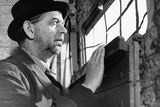
Tribute to Vlastimil Brodský 2002 / Jakob, der Lügner / Germany, Czechoslovakia 1974
It is wartime and Jakob has been living for several years in the Jewish ghetto. The constant chicanery and exhausting work are proving unbearable for everyone. People are becoming apathetic and they lose the will to survive until the day Jakob starts pretending that he has a radio hidden away which gives him encouraging daily reports about approaching freedom… Nominated for an Oscar, the film is dominated by Vlastimil Brodskŕęs a top notch performance, honoured at the Berlinale with Silver Bear.

Enduring drudgery and starvation is not as bad as being exposed to cruel and arbitrary rule and humiliation, without the least chance, day after day, of a moment of privacy. War is raging and Jakob Heym lives in a Polish ghetto. Under such conditions it is enough to be delayed outside after the curfew: the searchlights stop him dead in his tracks. But this time they’re rather lenient at the police station. While there, Jakob overhears a radio broadcast announcing the unstoppable approach of the Soviet army. This little man, with his careworn face and terrified look, is no hero, yet the radio broadcast has given him an idea: he himself will pretend to have a carefully hidden radio. In this way Jakob will be able to regularly inform others of the war’s approaching end. It is an extremely dangerous idea, especially for him, but Jakob doesn’t renounce his plan because he knows that those around him need hope to survive. And so every day he passes on “fresh news” to a trio of friends: young Mischa whose parents have just been transported east, Herschel whose wife has been shot, and Kowalski, the barber whose wonderful shop Jakob used to frequent before the war. The fabricated news of their impending deliverance is passed round by word of mouth, and it truly offers lifesaving encouragement. At times Jakob feels waves of fear wash over him, but the eager faces around him prevent him from abandoning the game. Even when, on the transport train, he tells little Linda a fairy tale, which he recently heard on his radio…. Nominated for an Oscar, the film is dominated by Vlastimil Brodskŕęs a top-notch performance, honoured at the Berlinale with a Silver Bear.
101 min / Black & white, 35 mm
Director Frank Beyer
/ Screenplay Jurek Becker
/ Dir. of Photography Günter Marczinkowsky
/ Music Joachim Werzlau
/ Editor Rita Hiller
/ Producer Herbert Ehler
/ Production DEFA - Studio für Spielfilme, Fernsehen der DDR
/ Cast Vlastimil Brodský, Erwin Geschonneck, Henry Hübchen, Blanche Kommerell, Armin Mueller-Stahl

Frank Beyer (l932, Nobitz, GDR) studied directing at Prague’s FAMU in the years l952-55. He then worked as an assistant director in the DEFY studios, in 1959 he debuted with the feature film Eine alte Liebe, followed by works which joined the countless attempts to rid domestic production of ideological and formal schematism. He consistently endeavoured to replace the pathos of films about the Second World War with an unpretentious humanist tone in the dramas Fünf Patronenhülsen (l960), Königskinder (l962) and Nackt unter Wölfen (l962). The most successful films created in this spirit was Jakob, der Lügner (l974), which was nominated for an Oscar and starred Vlastimil Brodský. Beyer took a similar interest in East German contemporary life; the culmination of his criticism of socialist bureaucracy and amorality was the film Spur der Steine (l966). The film was immediately banned in the GDR and he was unable to make films for six years. He worked in stage direction and television, then, after his TV film Geschlossene Gesellschaft (l978) was banned, he began working in West Germany. The 1980s and 1990s saw him primarily working in television.
First-hand brews throughout the year.
Be among the first to learn about upcoming events and other news. We only send the newsletter when we have something to say.